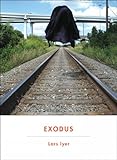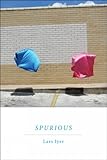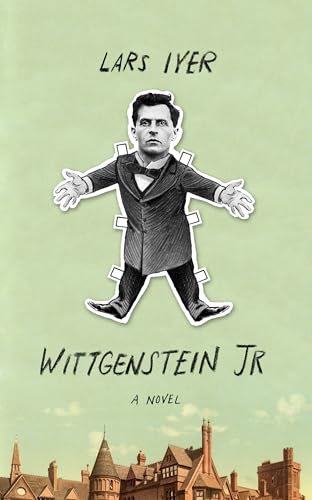1.
Lars Iyer’s first three novels — Spurious, Dogma, and Exodus — formed a loose trilogy, although each stood on its own. The books concerned a years-long conversation between a fictional writer and lecturer in philosophy, Lars, and W., his friend, tormentor, and colleague. They longed for nothing more than a truly original thought, or at least for a guide: someone who might either help them to think or, failing that, someone who might at least let them watch while thinking occurred on the premises. Leaders came and went:
Do you remember how he spoke?, [W.] says of our first leader. His seriousness? He wasn’t swayed by us. Our idiocy was annulled. Just for a moment, we were quiet. Just for a moment, idiocy was interrupted and we were calmed. It was marvelous, W. said.


 In Iyer’s new novel, Wittgenstein Jr., the cast is different — the characters this time around are a class of Cambridge philosophy students, who mostly move in a first-person-plural herd, and their young professor, upon whom they bestow the nickname Wittgenstein on the first day of class — but many of the concerns are the same. The longing for an original thought, for profundity, for intellectual flight. The tension between a) the aforementioned longing and b) a certain undergraduate tendency to fill the pages of the philosophy notebook with drawings of penises, which is to say the tension between whom you wish you were and whom you actually are. Thought as transcendence. The commercialization of higher education. The friction between the desire to think — to really think — and the baffled philosophy student’s self-loathing desire for someone else to do the thinking for them.
In Iyer’s new novel, Wittgenstein Jr., the cast is different — the characters this time around are a class of Cambridge philosophy students, who mostly move in a first-person-plural herd, and their young professor, upon whom they bestow the nickname Wittgenstein on the first day of class — but many of the concerns are the same. The longing for an original thought, for profundity, for intellectual flight. The tension between a) the aforementioned longing and b) a certain undergraduate tendency to fill the pages of the philosophy notebook with drawings of penises, which is to say the tension between whom you wish you were and whom you actually are. Thought as transcendence. The commercialization of higher education. The friction between the desire to think — to really think — and the baffled philosophy student’s self-loathing desire for someone else to do the thinking for them.
But in the new novel, a leader has finally appeared. The professor lectures before a class that drops from 45 in the first week to 23 in the second, from there to 18, and finally to a tenacious but utterly baffled 12:
None of us understands the problems he is wrestling with, we agree. None of us can follow his method — what is he looking for?
Not all of us care, of course. Mulberry is drawing cocks in his notebook. Guthrie wears sunglasses over closed eyes. Benwell groans audibly when Wittgenstein asks him a question.
No one’s sure whose idea it was to call him Wittgenstein, but it seems somehow fitting. He is a maddening teacher. No one quite follows what he’s trying to convey. But he seems, in some essential way, like the real thing.
2.
Wittgenstein Jr. begins in the first-person plural, and it takes some time for the narrator, Peters, to emerge from the crowd. Once he does, the book shifts gradually from we to I, from a crowd of students to Peters alone. He emerges as a fully-realized character only toward the end. This unusual structure could be seen as a mirror of the transition from adolescence into adulthood, but it also serves to echo one of the book’s major concerns, which is the way sustained dedication to a rigorous discipline can separate a person from the rest of the world. From one of Wittgenstein’s early classes:
He tells us about the vistas of logic. About logic’s austerity.
Logic makes you lose the world, he says. Logic drives you away from the world, into the eternal ice and snow.
 How to survive alone away from the world, in the land of ice and snow? Is there a way to live out there without being eaten alive? I’m reminded of a moment in Marilynne Robinson’s magnificent Gilead when the narrator, a minister, reflects on this order of thought:
How to survive alone away from the world, in the land of ice and snow? Is there a way to live out there without being eaten alive? I’m reminded of a moment in Marilynne Robinson’s magnificent Gilead when the narrator, a minister, reflects on this order of thought:
I have wandered to the limits of my understanding any number of times, out into that desolation…and I’ve scared myself, too, a good many times, leaving all landmarks behind me, or so it seemed. And it has been among the true pleasures of my life.
3.
But Wittgenstein doesn’t want to remain in the desolation, or to retreat from it; he wants to travel through it, to pass the limits of his understanding, beyond logic itself, to think himself to the end of philosophy and step out into a clean and altered world on the other side:
What will he say when the last words of philosophy are spoken?, Wittgenstein wonders. What will he say, when the spell of philosophy has been broken?
He’ll say nothing, he says. He’ll open his eyes. He’ll look up at the sky. He’ll laugh.
The year at Cambridge passes; Wittgenstein’s students drink themselves into oblivion at house parties and pass out on lawns and worry about the future, fall in and out of love and OD on exotic combinations of banned substances, act out scenes from Shakespeare and go for walks with Wittgenstein and try to understand what he’s talking about. As the months pass, Wittgenstein’s lectures grow darker. There are classes where he hardly speaks at all, and when he does, he’s often alarming: “There is a cost to thought, he says. He’ll pay with himself. He’ll sacrifice himself.”
Where the book falters slightly, in my opinion, is in its narrative tension. The Spurious trilogy was largely plotless, and was none the worse for it: plot was very much not the point. Here, the outlines of a plot appear, when Wittgenstein’s students begin to fear that he’s suicidal and move toward trying to save him. But this tension fades out, and other threads assume prominence; later it seems that this wasn’t so much a fully realized plot as a gesture toward plotting.
But this is a minor qualm, and the novel is stunning. Wittgenstein Jr. is Iyer’s strongest book to date. He has again managed to write a book that’s funny, unexpected, and profound, and his prose is suffused with a calm beauty. The book functions beautifully both as a story about a haunted young professor — a leader of the kind who appears once in one’s intellectual life and then is remembered forever after — and a portrait of the last few frantic minutes before adulthood.









